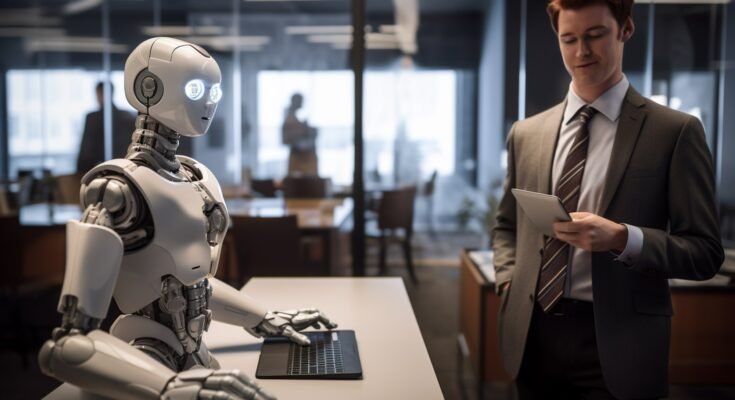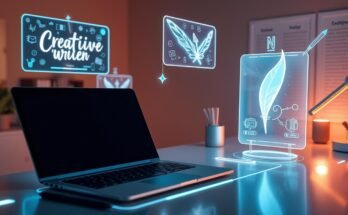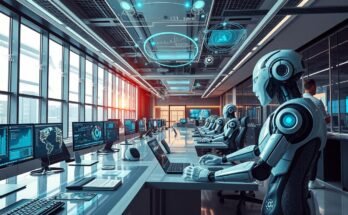Introduction
Artificial intelligence (AI) is changing many industries fast. This makes people wonder if AI will replace human workers. The impact on jobs and the future of work is a big concern.
In recent years, AI has changed the job market a lot. Many jobs are at risk, from making things to helping customers. AI is making some jobs less needed, making people worry about their jobs.

Businesses and leaders are trying to figure out what AI means for jobs. It’s important to know how AI is changing work now. We need to think about what skills humans still have and how humans and machines can work together. This will help shape the future of work with AI.
Key Takeaways
- The rapid advancement of artificial intelligence (AI) is transforming various industries and raising concerns about job displacement.
- Businesses and policymakers are grappling with the potential impact of AI integration on the workforce.
- Understanding the current state of AI technology and its impact on different industries is crucial for shaping the future of work.
- Exploring the skills that remain uniquely human and the opportunities for human-machine collaboration is essential.
- Anticipating and adapting to the changing job market due to AI integration is crucial for both individuals and organizations.
The Current State of AI Technology Replace Humans in the Workplace
Automation and artificial intelligence (AI) are changing the job world fast. Studies show many jobs could be taken over by machines. This makes people worry about losing their jobs.
Key Statistics on Workplace Automation
A report by McKinsey says up to 30% of jobs could be automated. This includes tasks like data work and physical jobs. These tasks are common in many industries.
Industries Most Affected by AI Integration
- Manufacturing: AI robots and systems are changing how things are made. They need less human help.
- Transportation and Logistics: Self-driving cars and smart delivery systems are changing how we move things around.
- Customer Service: Chatbots and virtual helpers can now answer simple customer questions and help.
Recent Technological Advancements
AI tech like machine learning and computer vision is getting better fast. It lets machines do tasks that used to need humans. This change is making work different in many fields.
| Technology | Application | Impact |
|---|---|---|
| Machine Learning | Predictive analytics, process automation | Increased efficiency, reduced human involvement |
| Natural Language Processing | Chatbots, virtual assistants, language translation | Automation of customer service and communication tasks |
| Computer Vision | Image and video analysis, object recognition | Automation of visual inspection and monitoring tasks |
The fast growth in automation, job displacement, and AI technology is changing work. It has big effects on jobs for the future.
Understanding the Impact of Artificial Intelligence on Employment
Artificial intelligence is changing how we work. It’s making jobs change too. This could lead to technological unemployment. It makes us worry about the future of work and its effects on the workforce.
AI might make some jobs disappear. Jobs that are repetitive or follow rules can be done by AI. This could change the workforce a lot.
| Industry | Potential Impact of AI |
|---|---|
| Manufacturing | Increased use of robotic automation in production lines |
| Financial Services | Automated investment analysis and portfolio management |
| Transportation | Autonomous vehicle technology disrupting traditional taxi and delivery services |
But AI isn’t all bad for jobs. It can also create new ones. Jobs in AI, data analysis, and machine learning are growing. These jobs need skilled people.
AI might also make humans better at some tasks. This could lead to a hybrid workforce. Humans and machines working together could be more efficient.

We need to think about how AI changes jobs. Policymakers, employers, and workers must work together. They need to find ways to help people adapt to these changes.
Jobs Most Vulnerable to AI Replacement
Artificial intelligence (AI) is getting better and better. This means some jobs are at risk of being taken over by machines. AI can make work faster and more efficient. But, it’s a problem for jobs that are simple, involve a lot of data, or need to talk to customers.
Routine and Repetitive Tasks
Jobs that are very predictable, like typing data or working on an assembly line, might be replaced by AI. AI can do these tasks quickly and without mistakes. It’s better at them than people in many cases.
Data Processing and Analysis Roles
Jobs that deal with lots of data are also at risk. AI can find important information in big data sets. It can spot patterns and make reports. This might mean fewer jobs for people who used to do this work.
Customer Service Positions
AI is getting good at talking to customers. It can answer questions, give advice, and even solve problems. This means jobs like call center workers and receptionists might be taken over by machines.
| Job Category | Vulnerability to AI Replacement |
|---|---|
| Routine and Repetitive Tasks | High |
| Data Processing and Analysis Roles | Moderate to High |
| Customer Service Positions | Moderate to High |

“As AI continues to advance, it’s crucial for workers to stay informed about the potential impact on their jobs and to proactively develop new skills to remain valuable in the evolving job market.”
Skills That Remain Uniquely Human
Artificial intelligence (AI) is getting better, but some skills are still only for humans. These skills are hard for AI to copy. They are getting more important as jobs change.
Creativity is a big one. AI is good at finding patterns and analyzing data. But it can’t think outside the box like humans do. Creativity helps us solve problems and come up with new ideas.
Emotional intelligence is also special to humans. We can understand and connect with others in ways AI can’t. This skill is key in many jobs, like in healthcare and customer service.
Critical thinking is another skill AI can’t match. Humans are better at making decisions that need a lot of thought. This skill is very useful in jobs like management and policy-making.
Adaptability is also a human strength. As AI changes the job market, being able to learn and adjust is crucial. This skill will help people succeed in a world where jobs are always changing.
As we look to the future, these human skills will be more important than ever. By improving these skills, people can thrive in a world where humans and machines work together.

“The future of work will be defined by the interplay between human and artificial intelligence. As AI takes over more routine tasks, the most valuable workers will be those who can harness the power of technology while leveraging their uniquely human skills.”
The Rise of Human-Machine Collaboration
Artificial intelligence (AI) is getting better, leading to a new way of working. Humans and AI are teaming up, changing the job scene. This partnership brings new chances for better work, more efficiency, and creativity.
Hybrid Workforce Models
Companies are mixing humans and AI in their teams. Humans bring creativity and thinking, while AI does the routine tasks. This mix makes work better and results stronger.
New Job Opportunities Created by AI
AI isn’t just taking jobs away. It’s also making new ones that need humans and AI working together. Jobs like AI trainers and designers are popping up. People who know how to work with AI will be wanted more.
Reskilling and Adaptation Strategies
Workers need to keep learning to stay ahead. They should learn new tech and improve their thinking skills. Employers also need to help by offering training and chances to grow.
The shift to working with machines is both a challenge and an opportunity. By learning and growing, workers can do well in the future.

Conclusion
The future of work is changing fast because of artificial intelligence (AI). AI can do many tasks and change old jobs. But, it also means humans and machines can work together better.
To do well in this new world, we need to be ready to learn and change. People in all jobs must learn new skills. This way, they can work well with AI and use their own special talents.
This helps them succeed in the future of work. They can handle the workforce disruption and avoid the problem of technological unemployment.
As AI changes work, we all need to work together. We should create a place where everyone can learn and grow. This way, AI can help us all do better and make a better future.
FAQ
What is the current state of AI technology in the workplace?
AI technology is becoming more common in workplaces. Many industries are seeing more automation. This change is big in areas like manufacturing and customer service.
How is artificial intelligence impacting employment and the job market?
AI is changing job markets in big ways. It might lead to job losses in some fields. But, it also creates new job chances.
Jobs like data entry, customer service, and routine tasks are at risk. But, AI also opens doors for new roles.
What skills remain uniquely human and less likely to be replicated by AI?
Skills like creativity, emotional smarts, and critical thinking are uniquely human. They are hard for AI to copy. These skills are getting more important as the job market changes.
How can human-machine collaboration shape the future of work?
Human-machine collaboration is creating new work models. It’s making workplaces more hybrid, with humans and AI working together. This change brings new job chances and the need to learn new skills.
What are the long-term implications of AI technology replacing humans in the workplace?
AI replacing humans could disrupt the workforce and lead to job losses. It might also mean we need to keep learning new things. But, it also brings chances for new jobs and better work efficiency.



